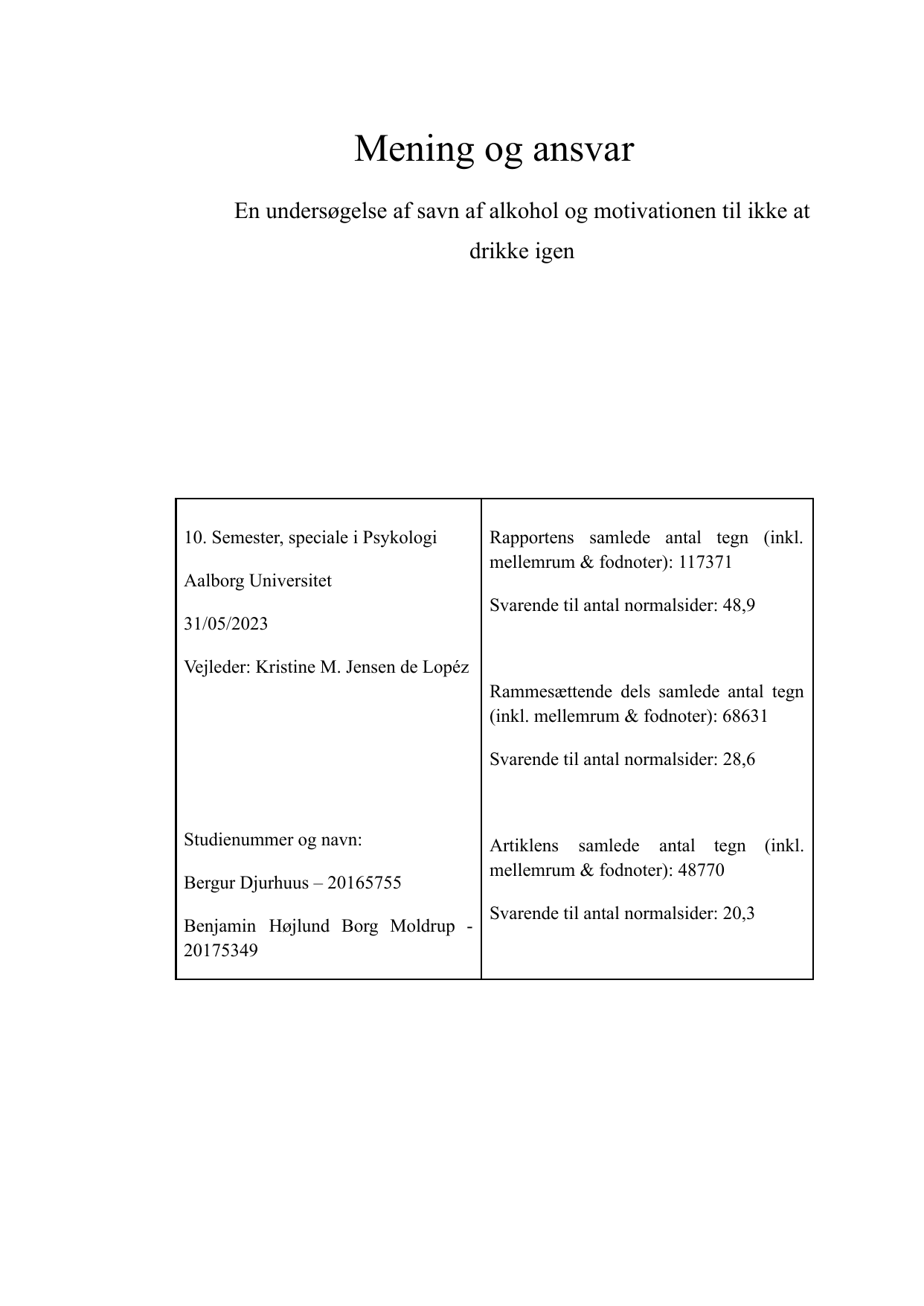
Mening og Ansvar: En undersøgelse af savn af alkohol og motivation til ikke at drikke igen
Oversat titel
Meaning and Responsibility: A study on longing for alcohol and motivation to not drink again.
Forfattere
Semester
4. semester
Uddannelse
Udgivelsesår
2023
Afleveret
2023-06-01
Antal sider
49
Abstract
Aim: The present study investigates if and to what degree self-compassion, length of sobriety, purpose and meaning in life is associated with a sense of longing for alcohol, for former alcoholics. It also investigates reasons former alcoholics give for their continued sobriety. Method: Data was gathered with an online questionnaire from relevant Danish channels for former alcoholics such as treatment centers and Facebook groups. Mixed methods were used. The measurements were the Danish Self Compassion Scale - short form (SCS-SF12DK), the Danish Purpose In Life Test - short form, asking about the degree and frequency of the former alcoholic’s sense of longing for alcohol, and the reasons that they do not start drinking again. A total of 232 sober participants completed the questionnaire. Results: Over 90% of the participants reported not to suffer from any sense of longing for alcohol from alcohol abstinence, showing that this in general is not an issue in sobriety. For the small variance in the sense of deprivation, small negative correlations were found -.27 < r < -.20, p < 0,05 with purpose in life, self-compassion positive subscale for self-compassion (mindfulness, common humanity, and self-kindness), negative subscale for self-compassion (self-judgment, isolation, and over-identification), and length of sobriety. The qualitative data were interpreted through a thematic analysis, and sorted into three different themes and one sub-theme, being: “The fear of losing one’s existence”, “I remember hell” (sub-theme), “In the present life I have the choice”, and “I no longer have any need for alcohol”. Implication: The quantitative data can be used to instil hope in a newly sober client, due to the general finding that when asked, a sense of longing for alcohol is almost exclusively not an issue for the sober alcoholic. The qualitative data gives an emphasis on the agency that can be acquired through knowing where one is powerless and where the energy can be laid. This can be important for the clinical practitioner to have in mind.
Aim: The present study investigates if and to what degree self-compassion, length of sobriety, purpose and meaning in life is associated with a sense of longing for alcohol, for former alcoholics. It also investigates reasons former alcoholics give for their continued sobriety. Method: Data was gathered with an online questionnaire from relevant Danish channels for former alcoholics such as treatment centers and Facebook groups. Mixed methods were used. The measurements were the Danish Self Compassion Scale - short form (SCS-SF12DK), the Danish Purpose In Life Test - short form, asking about the degree and frequency of the former alcoholic’s sense of longing for alcohol, and the reasons that they do not start drinking again. A total of 232 sober participants completed the questionnaire. Results: Over 90% of the participants reported not to suffer from any sense of longing for alcohol from alcohol abstinence, showing that this in general is not an issue in sobriety. For the small variance in the sense of deprivation, small negative correlations were found -.27 < r < -.20, p < 0,05 with purpose in life, self-compassion positive subscale for self-compassion (mindfulness, common humanity, and self-kindness), negative subscale for self-compassion (self-judgment, isolation, and over-identification), and length of sobriety. The qualitative data were interpreted through a thematic analysis, and sorted into three different themes and one sub-theme, being: “The fear of losing one’s existence”, “I remember hell” (sub-theme), “In the present life I have the choice”, and “I no longer have any need for alcohol”. Implication: The quantitative data can be used to instil hope in a newly sober client, due to the general finding that when asked, a sense of longing for alcohol is almost exclusively not an issue for the sober alcoholic. The qualitative data gives an emphasis on the agency that can be acquired through knowing where one is powerless and where the energy can be laid. This can be important for the clinical practitioner to have in mind.
Emneord
